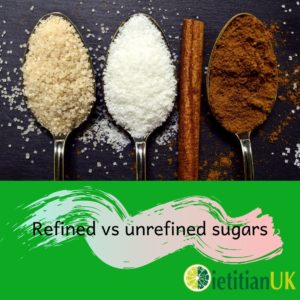Co-written by Ellen Rushmer and Priya Tew
Sugar: What do you think of when you see that word? For many people I work with the phrases are “sugar is bad for you” ” You shouldn’t eat it”.
Sugar has got itself a really bad rep and has been vilified. But does this mean we need to stop eating it? Well it is true that having too much sugar is not good for your health. I’d agree it is not something you should be consuming copious amounts of. What seems to happen in the nutrition world is we take it in turns to blame a nutrient for all our health problems. We’ve done it with fat and carbs, now sugar is being blamed for pretty much everything- from obesity to diabetes, cancer and heart disease. In actual fact a little bit of sugar eating sensibly is absolutely fine! It’s once again all about that balance.
All carbohydrates (sugars) are broken down to either glucose (a monosaccharide- a simple sugar), fructose (also a monosaccharide) or galactose (found in the disaccharide ‘lactose’: the sugar in dairy). When fructose and glucose are joined together it makes sucrose: your common ‘table sugar’ which is broken down during digestion to the monosaccharide’s glucose and fructose. Fructose and glucose are processed in different ways by the body: fructose by the liver and glucose by the stomach and the small intestines. The glucose is then released into the bloodstream to be used or stored.

One recent trend has been to swap from sugar to the unrefined ‘healthy’ alternatives (honey, maple syrup, coconut sugar, agave). These unrefined ‘natural’ sweeteners have the reputation that they’re better for you, natural and far healthier than sugar. But are they?
Sadly, no. They are not better for you. At all. And actually, if we are going to be really picky: all sugar is ‘natural’ coming from sugar cane (a root veg) or sugar beet (a grass). Both refined and unrefined sugars have the same effect on your bloods sugars. Sugar, in any form, causes a blood sugar spike and, essentially provides a quick energy source for your body.
Let’s look at some examples:
Honey– touted as a ‘natural’ and ‘healthy sugar’ alternative, but honey is composed of the monosaccharide’s glucose and fructose. It will have the same impact on your blood sugar as granulated sugar. Interestingly, it has more calories than sugar too.
Agave- extracted from the tequila plant and perceived as a natural sweetener and far healthier than table sugar. It is nearly 90% fructose, and remember fructose is a simple sugar (monosaccharide).
Brown rice syrup– is 100% glucose so leads to a massive blood sugar spike. It is essentially a syrup of made of glucose. Glucose is the simplest sugar that all sugary foods are broken down to through digestion. This means your body doesn’t have to much work and therefore the glucose goes straight into your blood stream causing a blood sugar spike. Suffice to say: brown rice syrup is definitely not ‘better’ for you!
Coconut sugar – looks like brown sugar, it is made from the sap of the coconut palm tree and is basically the same as palm sugar or jaggery (an Indian sweet). Whilst coconut sugar does contain some vitamins, minerals and fibre you won’t be getting much of these nutrients unless you eat vast amounts of coconut sugar (not recommended). Totally use this if you like the taste but it is still sugar.
Maple Syrup – this is the sap from the maple tree and it tastes delicious. Yes it does contain some minerals and antioxidants, but it is very much a sugar and you can get your nutrients from better sources.
So, as you can see: if you strip it all back to basics and look at it at a biochemical level there isn’t really any difference, and ultimately your body processes them all the same: as SUGAR. Use the one that you enjoy!
Currently, the recommended daily amount (RDA) for adults is no more than 7tsp a day of added (free) sugars. So, don’t be fooled, regardless of the form it comes in, sugar is sugar at the end of the day. Enjoy it when you have it but aim to reduce the sweetness of your diet overall.